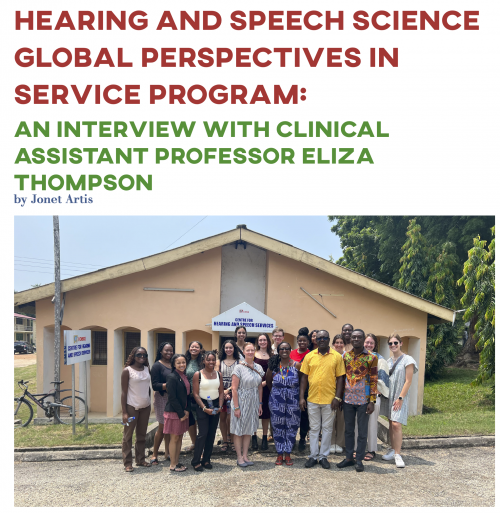When it comes to programs that promote cultural humility, one clear example is the education abroad program developed and implemented by Assistant Clinical Professor Eliza Thompson at the University of Maryland, College Park. This educational program provides students with the opportunity to learn and practice cultural humility both in the United States and while abroad in Ghana.
During the summer of 2023, Professor Thompson, along with Dr. Lacey Curry, an assistant clinical professor and audiologist, and 15 students from the Hearing and Speech Science Department at the University of Maryland College Park, embarked on a trip to Ghana for the inaugural Hearing and Speech Science Global Perspectives in Service Program. Professor Thompson credited the idea to create this education abroad program to her former professor, Dr. Cate Crowley, at the Teacher’s College, Columbia University. In 2010, Professor Thompson accompanied Dr. Crowley to Ghana for a study abroad program. After that trip, she was inspired to develop a similar program. This program was two years in the making.
 Since Professor Thompson is Ghanaian, and often takes trips to Ghana to visit her family, she was able to go there and work directly with partners, organizations, and universities. This allowed her to curate the exact program and experience that she wanted the students to have. She maintained these partnerships by continuing to communicate with them via zoom meetings and emails while in the United States. As Professor Thompson noted, “This is a capacity building program as we seek to support and build upon the current institutions that are already there. These collaborations led to the program being a success.”
Since Professor Thompson is Ghanaian, and often takes trips to Ghana to visit her family, she was able to go there and work directly with partners, organizations, and universities. This allowed her to curate the exact program and experience that she wanted the students to have. She maintained these partnerships by continuing to communicate with them via zoom meetings and emails while in the United States. As Professor Thompson noted, “This is a capacity building program as we seek to support and build upon the current institutions that are already there. These collaborations led to the program being a success.”
These partnerships and collaborations are also one goal of the program. Another goal of this program is to enhance students’ understanding of educational and healthcare systems in other countries. Through this experience, Professor Thompson was able to do just that. Before their trip to Ghana, the students were required to attend multiple lectures and engage in coursework. The lectures and corresponding coursework covered multiple topics, two of which were cultural humility and cultural competence. The students also learned about the state of speech-language pathology globally.
The course and the experiences in Ghana provided the students with an opportunity to learn about the legacy and the impact of colonization in Ghana and other African countries. These learning opportunities offered to the students were another success of the program. As for future programs, Professor Thompson noted, “It was so nice that we had to do it twice.” She is set to take another group of students to Ghana in the Spring of 2024. Professor Thompson is also looking to help support Ghanaian speech therapists through a mentorship network. 
The goal is to connect Ghanaian SLTs with American SLPs who can mentor and support them, as speech therapy is such a new field in Ghana. Professor Thompson is also looking at expanding the program to include another country and partnering with another university to offer the Ghana study abroad program. “This will offer UMD students an opportunity to collaborate with other students on projects related to language and literacy and other programmatic needs,” Professor Thompson stated.
For those of you who may be interested in starting a similar program, Professor Thompson stated, “I would, wholeheartedly, tell anybody that, if this is something that they are thinking about doing, they need to do it, but they need to do it well.” She went on to say, “You have to do it with the understanding that it starts long before you get there. It starts with how you write about Africa. How do you give people a sense of agency? Talk to them about their needs and their concerns.”
She worked diligently to make sure this program met the needs of the community, and also that it reached this goal: For the students to learn to be culturally responsive and practice cultural humility as clinicians. Professor Thompson told the students, “We are not going to Ghana to change them. We are going to adapt to the community. Adaptability is our purpose; we adapt to the environment in the hopes that, as we adapt to them, we are going to be transformed in the way we approach communication sciences and disorders as a whole.”
For more information about this study abroad program see this link. If you are interested in reading the perspective of the students about this program, see the blog posts on this link.



